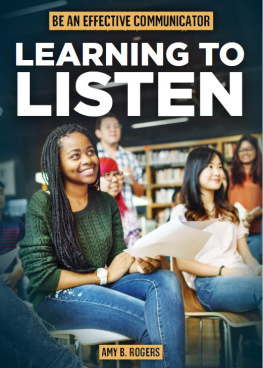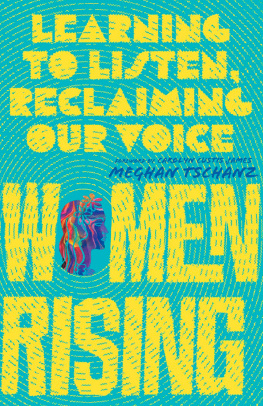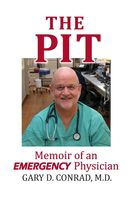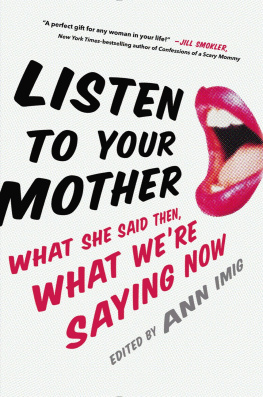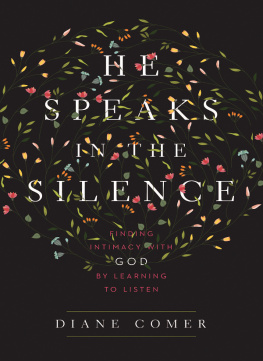Learning to Listen: A Memoir
Dedicated to:
Mom, Dad, Vivek, Eric Richard, Eric Shiva, Ethan Prakash, and every one of my patients who taught me the meaning of love.
Author's Note
I have altered the names of certain family members, patients, colleagues, and friends to protect their identities. At the heart of this memoir is a series of cherished memories and powerful experiences which shaped me into the person I am today.
Whatever happened, happened for the good.
Whatever is happening, is happening for the good.
Whatever will happen, will also happen for the good.
Lord Krishna in the Bhagavad Gita
A single sunbeam is enough to drive away many shadows.
St. Francis of Assisi
Mom
I paused before I knocked on the large, wooden door that separated me from my patient. Ms. K was a woman in her sixties who had suffered multiple infections of her knee, requiring numerous surgeries, countless rounds of intravenous antibiotics, at least ten hospital admissions, and an immense amount of patience and courage. She was admitted to the hospital the evening before with increased pain, swelling, and drainage from her right knee along with fever and chills, which were telltale signs of breakthrough infection. She would invariably require yet another surgery and more intravenous antibiotics. I braced myself for tears, anger, and a barrage of questions.
When I heard her weak voice utter the words come in, I walked into Ms. Ks room. She sighed as she greeted me, shaking her head. I dont know what to say, Dr. Prakash, she said. I just cant believe Im here again. I sensed defeat more than the anger and despair I had anticipated. We discussed how she had been doing since her last surgery several months ago and she said she was doing fairly well until the past week, when the symptoms started and gradually worsened to the point that she was not able to walk. As she continued to describe the pain and swelling she experienced in her knee, her eyes welled and she stopped mid-sentence, taking a deep breath and clenching her fists. I just dont know if I can keep doing this, Dr. Prakash, she gasped in between sobs. I just dont know if I have any fight left in me.
I pictured myself in the hospital bed and imagined I was on my eleventh hospitalization, struggling with pain and swelling in my knee to the point I couldnt walk, separated from my husband and children yet again for at least five to seven days, facing a prolonged recovery and ongoing adjustment of antibiotics, and anticipating another long journey of six to eight weeks of intravenous antibiotics, weekly blood draws, and several more doctors appointments. This was in addition to the high likelihood I would be hospitalized yet again because my treatment would fail. I wondered if I would have any fight left in me and struggled with my honest answer. I reached out and held Ms. Ks hand. I told her that I was inspired by her strength and her courage. I emphasized that she had made it this far, would undoubtedly get through this, and that the entire health care team was behind her to help her through the process. I know you can do this, I finished. We locked eyes and she gingerly nodded her head, her renewed sense of hope palpable as she began to smile through her tears.
Within a few days, I received a lovely message from Ms. Ks close friend. She thanked me profusely for caring for her friend and emphasized that my compassion and believing in Ms. K made all the difference in her care. The wonderfully human connection I established with Ms. K, coupled with the affirming letter I received from her friend, renewed my love and passion for my work as an infectious diseases physician. The experience solidified what I continue to learn with each patient encounter, which is that at the heart of our profession is the relationship we establish and build with our patients.
This is the story of an Indian girl born in France, raised in the United States, who was an English major in college and then joined the Air Force, who ultimately fulfilled her lifelong goal of becoming a doctor, and then married a White man with whom she is raising two bi-racial children in an ever complex universe. I read this sentence and raised my eyebrows. There are so many components of my story that are intriguing, inspiring, and impactful, but I had to ask myself one important question. What are the stories that need to be told, that must be heard? After much reflection, I realized that it was the stories of my beloved patients, with a backdrop of my experiences as an Indian girl growing up in the United States and how these very experiences played a vital role in shaping the type of physician, mother, wife, solider, and citizen I would someday become.
And so, where do I begin? I thought of starting from the very beginning in Strasbourg, France, where my father worked as a senior research scientist, where he and my mother began the first part of their journey as a married couple, and where I was born. I wondered whether I should start with anecdotes from my childhood, and my various interactions with adults and children who were fascinated by my ethnicity and perplexed by the fact that I spoke with virtually no accent as a Brown person. I also considered beginning with one of my patients themselves, as they are the soul of this story. However, I never would have successfully navigated the multiple complex experiences of my childhood, nor had the privilege of connecting with any of my patients without the beating heart of my very existence and my greatest champion. Therefore, my story begins with my mother.
I have always loved to write. A quiet and somewhat lonely child at school, my imagination was a vehicle to another world, where I was free to create fascinating creatures and characters who kept me company as I helped them navigate their curious conundrums and difficult dilemmas. When I was seven, my mother bought me a Hello Kitty spiral bound notebook with a matching eraser, pencil sharpener, set of pencils, and vinyl pencil case. I still remember the distinct smell of the notebook as I opened it each time; the woodsy, earthy scent of the pages mixed with the more artificial one that wafted from the shiny cover. I would sharpen my pencils and eagerly write about talking ducks, a pet elephant I named Fatso, a magic pencil, and a mouse that sharpened its tail. The last story was about God, who helped teach me how to ride a bike. This one was my mothers favorite.
While the neighborhood kids were outside riding their bikes or on play dates, I would perch myself on a small, red stool in front of a little Strawberry Shortcake dresser that I used as a desk and write to my hearts content. I was alone but far from lonely, immersed in the dramatic escapades of my colorful characters. After school and on weekend afternoons, I would keep my mother company in the kitchen. I would look up from my notebook from time to time to watch her cut vegetables and throw them into a pan of hot oil, the sizzling sound immensely satisfying. She would smile and ask me about the latest adventure of my writing and I would keep her informed, motivated by her genuine excitement and glee. She would then sit down with me and read through each story, marveling at my creativity and showering me with hugs, kisses, and encouragement to keep writing. So, I did.
My mother earned her masters degree in English literature and language at Farook College in India. She was awarded the Gold medal, the highest honor for a graduate student at her institution. Berated by many family members for not marrying at the age of eighteen like so many of her friends and relatives, she did not oblige them, focusing on her studies instead as she recognized and honored her talent. She didnt mind the whispers at public events, the looks of pity from concerned aunts and uncles, or the barrage of questions from numerous people about why she didnt want to marry and have a family. My mother made the decision to focus her efforts on meeting her goals, and not the goals of others.


